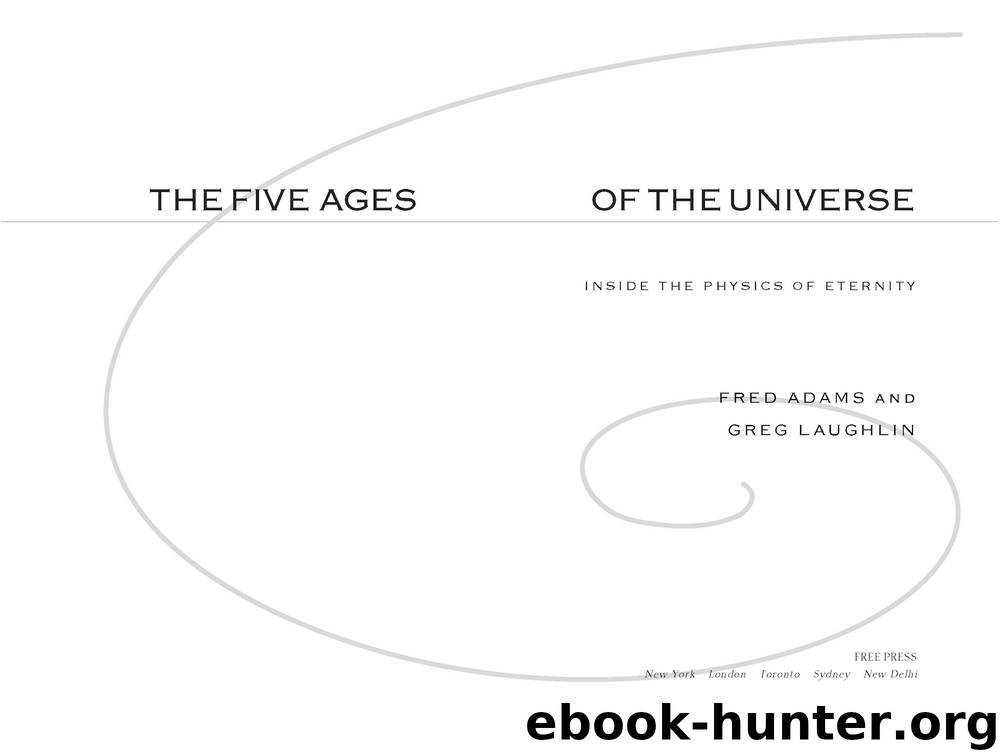The Five Ages of the Universe by Fred C. Adams & Greg Laughlin

Author:Fred C. Adams & Greg Laughlin
Language: eng
Format: epub
Publisher: Free Press
BASIC BLACK HOLE WEIRDNESS
Black holes make a mockery of our common sense ideas concerning space and time. During the Black Hole Era, the universe becomes a very alien place. From our current vantage point in the Stelliferous Era, black holes are a mere curiosity. They have little bearing on our Earthbound lives and do not significantly affect the evolution of the galaxy. In the Black Hole Era, however, general relativity and black holes reign supreme—they are absolutely essential to the everyday business of running the universe. Before pushing the clock beyond the 40th cosmological decade, we need to examine several ideas from the theory of general relativity. We can then taste the intriguing blend of simplicity, elegance, and sheer strangeness that characterize black holes.
Imagine a rocket floating through space, far away from the gravitational influence of any planets or stars. The engines are cold and the rocket drifts in a straight line at a constant speed. Inside the hold, the cargo is weightless. Astronauts hang suspended, and Tang transforms itself into glistening orange spheres as the rocket and its contents travel through space together. Suddenly, someone turns the rocket engines on at full power. Exhaust roars away from the thrusters, the hull pushes forward, and the startled astronauts find the floor rushing up to meet them. The Tang splatters. As the engines continue to fire, the rocket accelerates and its speed continually increases. The astronauts stay pressed onto the floor.
In a rocket equipped with weak engines, the acceleration is not very rapid. If the astronauts leap toward the ceiling, the rocket floor would only gradually catch up with them. They would feel like they were walking on the Moon, where gravity is weak and jumping is easy. As the engines produce larger accelerations, however, the floor of the rocket comes to mimic the surface of Earth. That is, if the engines are adjusted so that during each second the rocket’s speed increases by 9.8 meters per second, then objects fall to the floor in exactly the same way that they fall to Earth’s surface. Most importantly, if the rocket has no windows, the space travelers inside have no way of knowing whether the acceleration they feel is due to the force from the rocket engines, or due to the gravity of a planet.
At first glance, this statement of equivalence, which equates the effects of gravity and acceleration, might not seem particularly intriguing. Einstein realized, however, that the equivalence between gravity and acceleration is extraordinarily profound. He used this concept as a point of departure in developing the theory of general relativity. In turn, general relativity has enlightened us about the strange properties of black holes.
An unswerving acceptance of the equivalence principle forces us to abandon our everyday conception of absolute time. Consider a clock taped to the floor of a large rocket, and another clock fixed to the ceiling. The clocks are designed so that they broadcast a radio announcement of the time: “The time at the tone is . .
Download
This site does not store any files on its server. We only index and link to content provided by other sites. Please contact the content providers to delete copyright contents if any and email us, we'll remove relevant links or contents immediately.
| Aeronautics & Astronautics | Astronomy |
| Astrophysics & Space Science | Comets, Meteors & Asteroids |
| Cosmology | Mars |
| Solar System | Star-Gazing |
| Telescopes | UFOs |
Tools of Titans by Timothy Ferriss(7743)
Turbulence by E. J. Noyes(7665)
Astrophysics for People in a Hurry by Neil DeGrasse Tyson(4977)
Secrets of Antigravity Propulsion: Tesla, UFOs, and Classified Aerospace Technology by Ph.D. Paul A. Laviolette(4870)
Design of Trajectory Optimization Approach for Space Maneuver Vehicle Skip Entry Problems by Runqi Chai & Al Savvaris & Antonios Tsourdos & Senchun Chai(4812)
Room 212 by Kate Stewart(4707)
Pale Blue Dot by Carl Sagan(4580)
The David Icke Guide to the Global Conspiracy (and how to end it) by David Icke(4352)
A Journey Through Divination and Astronomy by Publishing Pottermore(4236)
Apollo 8 by Jeffrey Kluger(3484)
Goodbye Paradise(3415)
Losing the Nobel Prize by Brian Keating(3411)
COSMOS by Carl Sagan(3317)
The Five People You Meet in Heaven by Mitch Albom(3298)
Brief Answers to the Big Questions by Stephen Hawking(3221)
How to Read Water: Clues and Patterns from Puddles to the Sea (Natural Navigation) by Tristan Gooley(3212)
The Order of Time by Carlo Rovelli(3054)
How to Read Nature by Tristan Gooley(3052)
A Brief History of Time by Stephen Hawking(2800)
